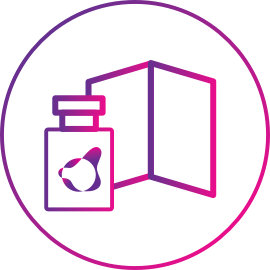Savings & Support
Support tailored to your eligible patient’s Retevmo treatment journey*
Enroll your patients (PDF)To enroll your eligible patients in all or any of these support programs*, please call the Lilly Oncology Support Center at 1-866-472-8663, Monday—Friday, 8 AM—10 PM ET.

Retevmo Savings Card
Eligible commercially insured covered patients pay as little as $0 a month.†
Download Savings CardBy using the Retevmo Savings Card (“Card”), you attest that you meet the eligibility criteria, and you agree to comply with the terms and conditions described below:
Card Eligibility:
- You have been prescribed Retevmo consistent with FDA approved product labeling
- You are enrolled in a commercial drug insurance plan
- You are not enrolled in any state, federal, or government funded healthcare program, including, without limitation, Medicaid, Medicare, Medicare Part D, Medicare Advantage, Medigap, DoD, VA, TRICARE®/CHAMPUS, or any state prescription drug assistance program.
- You are a resident of the United States or Puerto Rico
- You are 18 years of age or older
Card Terms and Conditions
For patients with commercial drug insurance coverage for Retevmo: You must have commercial drug insurance that covers Retevmo and a prescription consistent with FDA-approved product labeling to pay as little as $0 for a 1-month prescription fill of Retevmo. Month is defined as 30-days. Card savings are subject to a maximum monthly savings of wholesale acquisition cost plus usual and customary pharmacy charges and separate maximum annual savings of up to $25,000 per calendar year. Subject to Lilly USA, LLC’s (“Lilly”) right to terminate, rescind, revoke, or amend Card eligibility criteria and/or Card terms and conditions which may occur at Lilly’s sole discretion, without notice, and for any reason, Card expires and savings end on 12/31/2024.
Additional Program Terms and Conditions
If you have an insurance plan that is participating in an alternate funding program (“AFP”) (examples include, but are not limited to, ImpaxRX, Payer Matrix, SHARx, Script Sourcing, and Paydhealth) that requires you to apply to the Retevmo Savings Card Program or otherwise pursue specialty drug prescription coverage through an alternate funding vendor as a condition of, requirement for, or prerequisite to coverage of Retevmo, you are not eligible for and are prohibited from using the Retevmo Savings Card Program. AFPs include programs where coverage, reimbursement, or patient out of pocket costs for a product in some way vary based on the availability of a manufacturer co-pay program. AFPs may modify, delay, deny, restrict, or withhold insurance benefits or coverage from patients, or exclude Lilly products from coverage contingent upon a member’s use of Retevmo Savings Card Program. You agree to inform the Retevmo Savings Card Program if you are or become a member of such an alternative funding program. You are responsible for any applicable taxes, fees, and any amount that exceeds the monthly or annual maximum Card savings. Monthly and annual maximum savings are set at Lilly’s sole and absolute discretion and may be changed with or without notice at any time for any reason. At its sole discretion and with or without notice, Lilly may reduce, eliminate, or otherwise modify the Card savings for any reason, including but not limited to if your commercial drug insurance plan imposes additional requirements which limits or prevents you from receiving coverage for Retevmo, only allows partial coverage for Retevmo, removes coverage for Retevmo and requires you to utilize the Card, does not provide a material level of financial assistance for the cost of Retevmo, or does not apply Card payments to satisfy your co-payment, deductible, or coinsurance for Retevmo. Card savings are not valid for: Massachusetts residents if an AB-rated generic equivalent is available; California residents if an FDA-approved therapeutic equivalent is available. You must meet the Card eligibility criteria, terms and conditions every time you use the Card. Card activation is required. No party may seek reimbursement from your health insurance, any third party, or any health savings, flexible spending, or other healthcare reimbursement accounts, for any amount of the savings received through the Card. By utilizing the Card, you agree that if you are required to do so under the terms of your insurance coverage for this prescription or are otherwise required to do so by law, you will notify your Insurance Carrier of your redemption of the Card. Card savings cannot be combined or utilized with any other program, discount, discount card, cash discount card, coupon, incentive, or similar offer involving Retevmo. You agree that this Card savings is intended solely for the benefit of you, the patient, and that the Card benefits are nontransferable. It is prohibited for any person to sell, purchase, or trade; or to offer to sell, purchase, or trade, or to counterfeit the Card. The Card is not insurance. Lilly has the sole right to interpret and apply Card eligibility criteria, and terms and conditions. Card eligibility, and terms and conditions may be terminated, rescinded, revoked, or amended by Lilly at any time without notice and for any reason. Eligibility criteria, and terms and conditions for the Retevmo Savings Card Program may change from time to time; the most current version can be found at https://www.Retevmo.com. You may be required to obtain a new Card, including if any Card terms and conditions have been terminated, rescinded, revoked, or amended by Lilly. Card void where prohibited by law. Subject to Lilly’s right to terminate, rescind, revoke or amend Card eligibility criteria and/or Card terms and conditions which may occur at Lilly’s sole discretion, without notice, and for any reason, the Card expires and savings end on 12/31/2024.
TRICARE® is a registered trademark of the Department of Defense (DoD), DHA.

MyRightDose: A Dose Exchange Program‡
May simplify midcycle dose changes for patients—MyRightDose ships the appropriate dose directly to your patient’s home in as early as 48 hours and at no cost to the patient.
‡Additional terms and conditions apply. See the MyRightDose enrollment form (PDF) for details.

Retevmo Interim Access Program
The Retevmo Interim Access Program may provide a temporary supply of Retevmo at no cost to insured, eligible patients who have been prescribed Retevmo for the first time and are experiencing a delay in their insurance coverage decision.§
§The Retevmo Interim Access Program (or “Program”) provides a 15-day supply of Retevmo at no charge for eligible, insured patients who are: 1) prescribed Retevmo for the first time after testing positive for a RET alteration, 2) experiencing a minimum 5-business-day delay in insurance coverage determination, 3) prescribed Retevmo for an FDA-approved indication or an indication medically supported by CMS-recognized compendia, and 4) enrolled in the Lilly Oncology Support Center, 5) residents of the United States or Puerto Rico. May not be combined with any other offer. Not available to patients whose insurers have made a final determination to deny the patient coverage for Retevmo. If a denial is received after the initial 5 business days have passed and appeal rights are being pursued, or if there is a persistent coverage delay, the patient, under appropriate circumstances, may be eligible for up to 3 additional 15-day supplies of Retevmo. Product provided through the Program is only available through the Program non-commercial specialty pharmacy. Product is provided free of charge and may not be sold, bartered, or returned for credit. Reimbursement cannot be sought from any third party for product provided under the program. Patients enrolled in Medicare Part D are prohibited from counting any portion of the cost of the product provided under the Program towards true out-of-pocket (“TrOOP”) costs for prescription drug calculations. No purchase contingency or other obligation accompanies program participation. This Program is not health insurance and does not guarantee coverage. Lilly reserves the right to change or end the program at any time. Benefits under the program are not transferable.

Insurance and Coverage Assistance*
Benefits investigation
- Helps eligible enrolled patients understand their coverage options, locate the appropriate specialty pharmacy, and identify their lowest possible out-of-pocket cost
Field reimbursement manager
- Helps patients access prescribed Lilly FDA-approved medicines

Retevmo Digital Starter Kit
The Retevmo Digital Starter Kit provides patients with key information and savings opportunities. Have patients text the following for more information:
RETL to 85099 for Retevmo NSCLC resources
RETT to 85099 for Retevmo thyroid cancer resources
*Retevmo Support programs and offerings are not a guarantee of coverage. Terms and conditions apply for all programs. See enrollment form for details.
Access Resources
Retevmo is available through:

Contracted specialty pharmaciesǁ

Hospital and health system practices

In-office dispensing practices (IODs)
Retevmo is available through contracted specialty pharmacies and can be purchased through authorized distributors.
See a list of specialty pharmacies (PDF)ǁEligible pharmacies can purchase Retevmo through authorized distribution partners. A list of authorized distributors can be found at lillytrade.com.
Here are some helpful resources to help you and your patients with common access issues

Retevmo access, reimbursement, and distribution
The access and reimbursement landscape can be complex and cumbersome. Information within the guide can help you navigate the complexities of the reimbursement landscape.
Download Distribution Guide (PDF)
Coverage authorization appeals letter
If an initial claim or coverage authorization request letter is denied, the payer may require a coverage authorization appeals letter.
download coverage authorization appeals letter (PDF)
Letter of medical necessity (LMN)
Many health plans require that an LMN accompany a coverage authorization appeals letter.
Download letter of medical necessity (LMN) (PDF)
Treatment plan guide
An easy-to-use resource to help the pharmacy develop electronic order sets that are included in electronic health record systems.
Download treatment plan guide (PDF)
Enrollment form
Enroll your patients to gain access to the Retevmo support offerings.
Download enrollment form (PDF)INDICATIONS
Retevmo is a kinase inhibitor indicated for the treatment of:
- adult patients with locally advanced or metastatic non-small cell lung cancer (NSCLC) with a rearranged during transfection (RET) gene fusion, as detected by an FDA-approved test
- adult and pediatric patients 12 years of age and older with advanced or metastatic medullary thyroid cancer (MTC) with a RET mutation, as detected by an FDA-approved test, who require systemic therapy*
- adult and pediatric patients 12 years of age and older with advanced or metastatic thyroid cancer with a RET gene fusion, as detected by an FDA-approved test, who require systemic therapy and who are radioactive iodine-refractory (if radioactive iodine is appropriate)*
- adult patients with locally advanced or metastatic solid tumors with a RET gene fusion that have progressed on or following prior systemic treatment or who have no satisfactory alternative treatment options*
*These indications are approved under accelerated approval based on overall response rate (ORR) and duration of response (DoR). Continued approval for these indications may be contingent upon verification and description of clinical benefit in confirmatory trials.